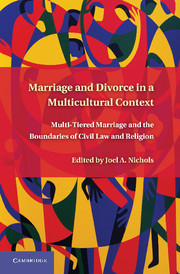 Marriage and Divorce in a Multi-Cultural Context
Marriage and Divorce in a Multi-Cultural Context Book contents
- Frontmatter
- Contents
- Detail Contents
- About the Editor
- List of Contributors
- Preface
- Permissions
- Introduction
- 1 Multi-Tiered Marriage
- 2 Pluralism and Decentralization in Marriage Regulation
- 3 Marriage and the Law
- 4 Unofficial Family Law
- 5 Covenant Marriage Laws
- 6 New York’s Regulation of Jewish Marriage
- 7 Political Liberalism, Islamic Family Law, and Family Law Pluralism
- 8 Multi-Tiered Marriages in South Africa
- 9 Ancient and Modern Boundary Crossings Between Personal Laws and Civil Law in Composite India
- 10 The Perils of Privatized Marriage
- 11 Canadian Conjugal Mosaic
- 12 Marriage Pluralism in the United States
- 13 Faith in Law? Diffusing Tensions Between Diversity and Equality
- 14 The Frontiers of Marital Pluralism
- Index
- References
12 - Marriage Pluralism in the United States
On Civil and Religious Jurisdiction and the Demands of Equal Citizenship
Published online by Cambridge University Press: 05 November 2011
- Frontmatter
- Contents
- Detail Contents
- About the Editor
- List of Contributors
- Preface
- Permissions
- Introduction
- 1 Multi-Tiered Marriage
- 2 Pluralism and Decentralization in Marriage Regulation
- 3 Marriage and the Law
- 4 Unofficial Family Law
- 5 Covenant Marriage Laws
- 6 New York’s Regulation of Jewish Marriage
- 7 Political Liberalism, Islamic Family Law, and Family Law Pluralism
- 8 Multi-Tiered Marriages in South Africa
- 9 Ancient and Modern Boundary Crossings Between Personal Laws and Civil Law in Composite India
- 10 The Perils of Privatized Marriage
- 11 Canadian Conjugal Mosaic
- 12 Marriage Pluralism in the United States
- 13 Faith in Law? Diffusing Tensions Between Diversity and Equality
- 14 The Frontiers of Marital Pluralism
- Index
- References
Summary
Introduction: the call for more pluralism and shared jurisdiction in u.s. family law
“Legal pluralism” is hot. Indeed, “legal pluralism is everywhere.” As Brian Tamanaha observes, not only is there “in every social arena one examines, a seeming multiplicity of legal orders, from the lowest local level to the most expansive global level,” but, in the last few decades, legal pluralism itself “has become a major topic in legal anthropology, legal sociology, comparative law, international law, and socio-legal studies.” But problems with defining and understanding legal pluralism continue to “plague” its study.
What of legal pluralism in family law? Is such pluralism already “everywhere,” if we just look closely? A common observation is that family law – and family law practice – in the United States have become global due to “the globalization of the family.” As people form families across geographic and national boundaries, lawyers and courts routinely deal with complex questions of jurisdiction and comity with respect to marriage, divorce, child custody, and the like.
- Type
- Chapter
- Information
- Marriage and Divorce in a Multi-Cultural ContextMulti-Tiered Marriage and the Boundaries of Civil Law and Religion, pp. 309 - 340Publisher: Cambridge University PressPrint publication year: 2011
